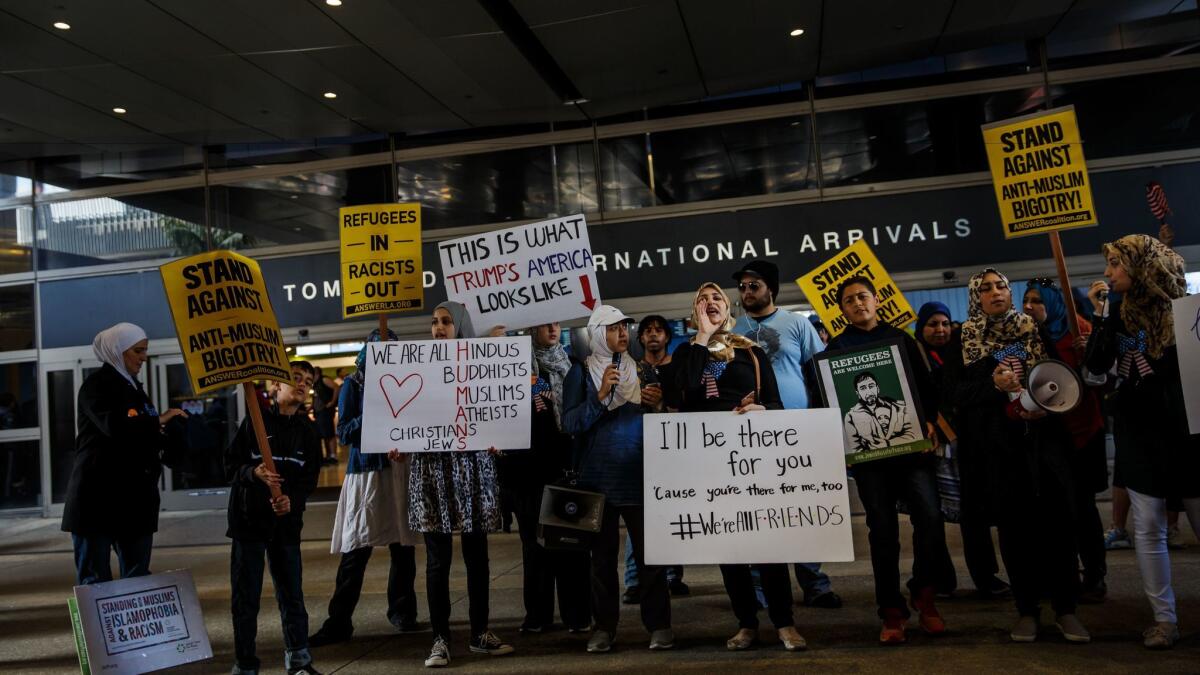Afghan family detained in L.A. despite having special visas will be freed

- Share via
Federal officials have agreed to free an Afghan family that had been granted special immigration visas but was detained after arriving at Los Angeles International Airport last week, prompting complaints from civil rights lawyers who rushed to court on its behalf.
On Monday afternoon, family members were in the process of being paroled, but it was unclear whether they would immediately fly to Seattle — their original destination — or spend the night in the Los Angeles area, said Mark Rosenbaum, an attorney with Public Counsel who is part of the legal team representing the family.
At a court hearing earlier in the day, government officials didn’t offer a clear explanation as to why they detained the family of five. They did say, however, that immigration officials had since returned the passports, which include the special visas, to the family.
Federal agents are scheduled to interview the family members in Seattle on April 5 to determine whether they can stay in the United States.
“This is a victory in a battle that should not have been fought in the first place,” said Rob Blume, one of the attorneys representing the family. “The government swung and missed on this one. They just got it wrong.”
The father, mother and their three children — ages 7, 6 and 8 months — arrived in L.A. on Thursday afternoon for a connecting flight to Seattle, where they planned to resettle, but were detained by U.S. Customs and Border Protection.
The family had been extensively vetted and approved for the visas because of the father’s work with the U.S. government, according to a federal court petition filed Saturday seeking release of the family. The father worked for U.S. officials for about a decade, Blume said.
The father, whose name was not disclosed for security reasons, worked at a U.S. government base where the Taliban took notice of locals who worked for U.S. forces, the lawyer said. He said the father had been physically and verbally assaulted, and received death threats from the Taliban. The father applied for a special visa in 2015.
Rosenbaum said the government’s handling of the case had sent the wrong recruiting message to foreigners who might consider working for U.S. forces: “You work for us, you work at your own peril.”
Federal authorities notified the attorneys that the family would be freed shortly before a federal judge was supposed to decide whether to extend a temporary restraining order that blocked federal authorities from moving the family out of the Central District of California, which includes much of Southern California. Attorneys had also planned to ask the judge to release the family on parole.
U.S. District Judge Josephine Staton, who is based in Santa Ana, issued the temporary restraining order over the weekend. On Monday, she said she would maintain jurisdiction of the case. Also, she ordered that the government cannot detain or remove the family from the U.S. without giving 72 hours notice to her or the family’s attorneys.
Immigration and Customs Enforcement officials have repeatedly declined to publicly explain the reasons why the family was detained.
The case generated national news over the weekend, coming at a time of heated debate over President Trump’s attempts to restrict entry to the U.S. from some majority-Muslim countries. Afghanistan, however, was not among the countries that were included in Trump’s first travel ban or his new ban issued Monday.
After being detained at LAX for two days, the father was taken to a detention center in Orange County, and the mother and three children were taken to a similar facility in downtown Los Angeles. During the detention, immigration officials prevented the family from communicating with attorneys, Rosenbaum said.
“They had them for 40 hours incommunicado,” he said.
On Saturday morning, a habeas corpus petition was filed in U.S. District Court on behalf of the family by Public Counsel and the law firm Gibson Dunn. Then, at a brief meeting with the mother, attorneys learned that she and her children were going to be transported to a family detention center in Texas.
Attorneys then filed an emergency motion for a restraining order in federal court to prevent the government from transferring the family out of state.
The process for obtaining the special immigrant visa the family obtained before its arrival involves intensive vetting, including interviews, security checks, medical examinations and fingerprints — as well as a finding that the applicant has experienced a serious threat because of his or her work with the U.S. government, according to the court petition.
Rosenbaum and Blume said they had never heard of anyone else with special immigrant visas experiencing similar treatment.
“That happens in Kafka and happens in authoritarian governments,” Rosenbaum said. “This is not supposed to happen here.”
Times staff writers Ruben Vives and Paloma Esquivel contributed to this report.
Follow me on Twitter: @thecindycarcamo
ALSO
Trump orders new, narrower travel ban that goes into effect in 10 days
Legal experts: New travel ban has a better chance of surviving court challenges than the old one
UPDATES:
6 p.m. This article was additional details about the case.
4 p.m.: This article was updated with details from Monday’s federal court hearing, comments from the family’s attorneys and more background about the case.
12:35 p.m.: This article was updated to add that an ICE spokeswoman declined to comment.
This article was originally published at 12:12 p.m.
More to Read
Sign up for Essential California
The most important California stories and recommendations in your inbox every morning.
You may occasionally receive promotional content from the Los Angeles Times.











